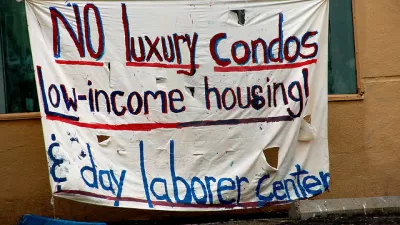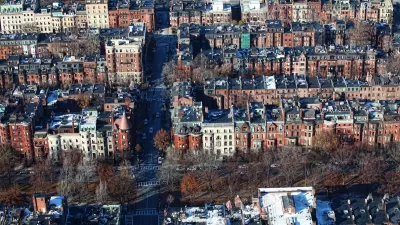Now that tech companies have "discovered" Portland, Oregon, longtime residents question whether the progressive city has done enough to protect them from displacement. Sound familiar?

In the past few years, major tech companies like Google, Airbnb, and Amazon have opened offices in Portland. As housing prices, rents, and evictions skyrocket, the specter of San Francisco looms large.
But a fate of displacement and unattainable housing is not necessarily inevitable, Alana Semeuls points out in The Atlantic—if the city takes action:
[I]t’s not tech or newcomers that are solely to blame. Portland hasn’t been able to slow its rental crisis because in a city that prides itself on progressivism, many of the traditional tools used to create more affordability are off the table.
Semeuls notes a lack of protections for tenants in Portland, as well as throughout the state. In September 2015, conditions drove the Community Alliance of Tenants, a nonprofit, to declare a renter state of emergency.
Thanks in part to pressure from CAT and other groups, the city has begun enacting some tenant protections and affordability measures. A month after CAT's petition, the City Council declared its own housing emergency, and the mayor promised $20 million for affordable housing projects in North and Northeast Portland. Tech companies have also expressed interest in keeping Portland affordable—having moved there, Semeuls writes, in part to avoid the expense of being in San Francisco.
But these efforts have met resistance from some Portland residents who oppose increasing neighborhood density. As the debate continues to play out—and, some say, call the city's progressive identity into question—CAT’s executive director notes: "There are limits to white urban liberalism. When it comes to housing and schools, all of that goes out the window."
FULL STORY: Can Portland Avoid Repeating San Francisco’s Mistakes?

Alabama: Trump Terminates Settlements for Black Communities Harmed By Raw Sewage
Trump deemed the landmark civil rights agreement “illegal DEI and environmental justice policy.”

Study: Maui’s Plan to Convert Vacation Rentals to Long-Term Housing Could Cause Nearly $1 Billion Economic Loss
The plan would reduce visitor accommodation by 25% resulting in 1,900 jobs lost.

Planetizen Federal Action Tracker
A weekly monitor of how Trump’s orders and actions are impacting planners and planning in America.

Federal Homelessness Agency Places Entire Staff on Leave
The U.S. Interagency Council on Homelessness is the only federal agency dedicated to preventing and ending homelessness.

Restoring Northern India’s Himalayan ‘Water Temples’
Thousands of centuries-old buildings protect the region’s natural springs and serve as community wells and gathering places.

Milwaukee to Double Bike Share Stations
Bublr Bikes, one of the nation’s most successful, will add 500 new e-bikes to its system.
Urban Design for Planners 1: Software Tools
This six-course series explores essential urban design concepts using open source software and equips planners with the tools they need to participate fully in the urban design process.
Planning for Universal Design
Learn the tools for implementing Universal Design in planning regulations.
Caltrans
Smith Gee Studio
Institute for Housing and Urban Development Studies (IHS)
City of Grandview
Harvard GSD Executive Education
Toledo-Lucas County Plan Commissions
Salt Lake City
NYU Wagner Graduate School of Public Service





























